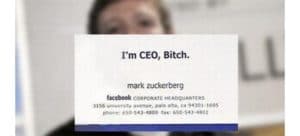Recently, the webzine So Busy Girls headline: "Stop listening to these 7 lies that cosmetics brands want us to believe". That brands deceive us seems to have become a commonplace, a totally irrefutable reality! Visit "Brand bashing " is all the rage.
But if we can no longer trust brands, where can we turn? Fortunately, social media marketing has invented the concept of the "trusted third party.
The trusted third party is a consumer like you and me... but whom we don't know from Adam or Eve - and yet we're going to put all our trust in him: he liked this product, that service... great, we're going to be able to buy it, subscribe to it!
No-one books a night's stay at a hotel any more without having carefully scoured the comments and photos of other travellers - and with good reason: very often the swimming pool immortalised by individuals bears only a passing resemblance to the one taken with a wide-angle lens by the hotelier!
However, at the end of 2017, the best restaurant in London for Tripadvisorwith the catchy name of "The Shed at Dulwich... only existed on the social network: a journalist invented it one bored evening, asked a few friends to post a few glowing comments ... and that's how a posh restaurant with no clientele whatsoever came into being!
Fortunately, Community Managers are on the lookout for them and are tracking them down... well, especially the negative ones: it has even become an interesting little business for consultants to help remove them. Another example is the Eldorado real estate explaining "How to delete a negative comment from a traveller for seasonal lets.
As for false positive reviews, which are just as illegal... nobody's really out to get them!
There are, of course, the review sites "verified... but it's not a panacea either, because sometimes it's a real struggle to get a real negative comments: Internet users are complaining about it in the forums. Hence the "good scores displayed by certain service providers: "More than 80% of all reviews collected via the Trustville platform are positive".reads here.
In fact, negative reviews have an unfortunate tendency to disappear from the radar: you are indisposed after a dinner in a partner restaurant of The Fork ? Hurry to your GP: "We would like to inform you that it is essential that you provide us with material proof, such as a medical certificate, without which we will be unable to publish your comment as it stands. ".
Forums are also full of complaints from customers whose negative reviews have disappeared, here, here an here.
The system can even become pernicious. After requesting assistance from your ISP, you receive a short satisfaction questionnaire; if your problem has not been dealt with correctly, it's not the fault of the employee but of the operator. In short, you're very unhappy... when you receive the e-mail asking for your opinion: how do you respond?
Negatively? You are penalising an employee who is not guilty - because these marks can be used in his annual appraisals. Positively, then? But still, the fault remains and you're really not happy!
This brief overview highlights the fragility of the concept of a trusted third party! So who should you trust? Paradoxically, to those whom everyone criticises: brands.
Not all brands... since there are grounds for complaining about some, and rightly so! But to those who make an effort to prove themselves, if not irreproachable, at least worthy of consumer confidence. Those whose advertising is in line with their customers' day-to-day experience.
Brands should not rely on "third parties It's up to them to restore confidence. And, for the best companies, to make a difference.





